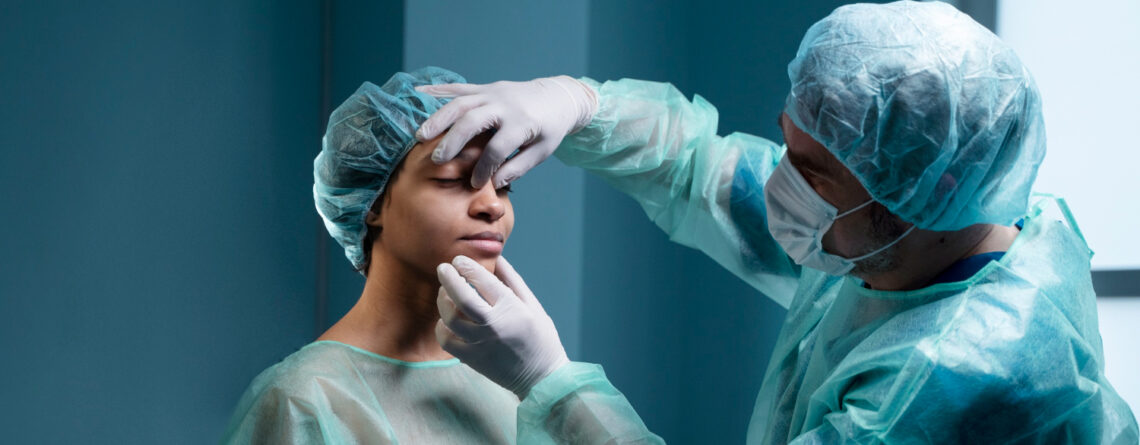Nasopharynx is nasal part of pharynx (its initial anatomical section), located behind the nasal cavity and connected to it by two internal nasal openings (choans). Immediate continuation of nasopharynx is oropharynx, the border between them is conditional, and passes in plane where the hard palate is located. Oropharynx, in turn, continues into laryngopharynx, which passes into larynx. There are 4 openings in nasopharynx - 2 choanae and 2 openings of auditory tubes on side walls connecting nasopharynx with middle ear cavity. There are also 2 tubular tonsils on nasopharynx side walls, and an unpaired pharyngeal tonsil on back. According to its function, nasopharynx is a respiratory organ that conducts air from nasal cavity down to larynx.
Nasopharyngeal cancer is a group of malignant oncological diseases that are primarily localized in nasopharynx. The most common neoplasm type of this location is squamous cell carcinoma.

Nasopharyngeal cancer is a serious disease that often has an unfavorable prognosis precisely because of late detection, because disease symptoms appear quite late, which is why pathology is diagnosed in advanced stages. If you have suspicions of this disease, or have already been diagnosed with it, don't waste time, seek professional help from highly qualified oncologists. Such specialists work in Oncology Department at Maimonides Multidisciplinary Medical Center. Our clinic works in close cooperation with the best Israeli oncology centers. All clinical cases are conducted jointly by the attending oncologist, the head of the department – Dr. Stefanska Irina and oncologist in charge directly from Israel. Thus, in Ukrainian conditions, every patient can get access to one of the best in the world – Israeli medicine.
Our medical center works under the patronage of “Keren Or for our Child” the Charitable Foundation, so all cancer patients can count on financial support to pay for necessary treatment.
Nasopharyngeal cancer is a serious disease, but it is completely curable with a comprehensive approach to therapy process. Men over 50 years of age, especially those who have a habit of smoking or abuse alcohol, are mostly affected. In the age group of men aged 30-50 who do not smoke, squamous cell carcinoma development of nasopharynx is most often associated with human papillomavirus persistence, that transmitted sexually.
Nasopharyngeal cancer is a serious disease, but it is completely curable with a comprehensive approach to therapy process. Often, not only an oncologist, but a whole multidisciplinary team of specialistsworks on patient’s treatment. Maimonides Medical Center employs all necessary narrow specialists – oncologists, surgeons, otolaryngologists (ENT doctors), radiation therapists, chemotherapists and others. In their practice, our doctors are guided by modern global treatment protocols and recommendations. At the same time, the approach to each patient is not templated, but purely individual. Examination plan and treatment scheme are selected for each individual, depending on main diagnosis, type of tumor, disease stage, concomitant diseases presence and patient’s wishes.
Only highly qualified specialists work in our clinic. Most of them have completed internships at the most famous oncology centers in the world. Each doctor is flawlessly familiar with modern diagnostic and treatment procedures, and has communication skills with oncology patients. If a certain narrow specialist or rare medical and diagnostic equipment is not available, the patient is referred to subsidiary institutions of Maimonides Medical Center or our Israeli partner clinics, where he is guaranteed to receive the full range of necessary medical services, where he is guaranteed to receive the full range of necessary medical services.
Nasopharyngeal cancer causes
The direct cause of a malignant tumor development, including nasopharynx, is a mutation in one cell, its uncontrolled growth and division, which leads to tumor development.
Among the risk factors of nasopharyngeal cancer development should be mentioned:
- Male.
- smoking.
- Alcohol abuse.
- Ethnicity. This type of cancer is more prevalent in China, Southeast Asia and North Africa. In United States, Asian immigrants have a higher risk of this type of cancer than US-born Asians. Nasopharyngeal cancer risk is also higher among Eskimos in Alaska.
- Age. The disease can develop at any age, but is most often diagnosed in people over 50 years of age.
- Excessive consumption of salted or dried foods. Chemicals released during such foods cooking can enter nasal cavity and increase the risk of nasopharyngeal cancer. These chemicals exposure at an early age further increases carcinoma risk later in life.
- Epstein-Barr virus. It is associated with several rare cancers, including nasopharyngeal cancer.
- Family history. If you have a family member with nasopharyngeal cancer, your risk will be correspondingly higher.
Symptoms and types of nasopharyngeal cancer
Nasopharyngeal cancer is often manifested by enlarged lymph nodes appearance on neck, which are already affected by metastases. The lymph nodes of neck’s one half are anatomically connected with lymph nodes of the opposite side. As a result, bilateral metastasis is characteristic.Another symptom that occurs is hearing loss, usually caused by auditory tube blockage, as a result, effusion may appear in the middle ear cavity.
Other symptoms include:
- ear pain,
- purulent and/or bloody discharge from nose (usually only on one side),
- obvious nosebleeds,
- neurological disorders – due to certain cranial nerves paresis. As a rule, 4, 6 and 3 pairs of cranial nerves are affected.
As already mentioned, the most common type of nasopharynx malignant neoplasm is squamous cell carcinoma (nasopharyngeal carcinoma). It can be squamous non keratinized, squamous keratinized, basalioid squamous.
Other nasopharynx malignant neoplasms include: mucoepidermoid carcinoma, adenocarcinoma, lymphomas, fibrosarcoma, osteosarcoma, chondrosarcoma, and melanoma.
mong tumors located near nasopharynx, but anatomically unrelated to it, the most common are:nasal cavity adenoma, nasal cavity inverted papilloma, nasal cavity carcinoma, craniopharyngioma, nose and sinuses meningioma, nasal cavity osteoma, sphenoid and frontal sinuses cancer, ethmoid labyrinth cancer.

Nasopharyngeal cancer modern treatment
Nasopharyngeal cancer is a serious and difficult disease, but it can be completely cured with timely diagnosis and right approach to treatment.The main treatment advantage at Maimonides Medical Center is a comprehensive approach to each individual clinical situation. As a rule, treatment scheme includes a combination of several effective methods, which significantly improves long-term results and prognosis.
The therapeutic complex may include tumor surgical removal , radiation therapy, chemotherapy, targeted therapy, modern immunobiological drugs application and other treatment methods, depending on certain case. Patient can receive help from any narrow specialist – oncologist, surgeon, ENT doctor, plastic surgeon, radiation therapist, chemo therapist, etc. Also, all medical and diagnostic procedures can be performed in Ukraine, there is no need to leave the country.
Nasopharyngeal cancer surgical treatment is rarely used, as this type of neoplasm responds well to chemotherapy and radiation (the main treatment methods). Surgery can also be performed, but this requires a certain qualification of surgeon, because nasopharyngeal tumors are not easily accessible for resection.
Our medical center specialists perform the most complex syrgyries for nasopharyngeal cancer. Such surgical interventions are carried out with the stage of skull resection. To create surgical access during resection, a part of maxillary bone is usually removed. But in some cases, resection can be performed using an endoscopic technique.
Radiation therapy is used as primary and main treatment along with chemotherapy or as an adjunctive therapy after chemotherapy course or surgery to increase full recovery chances.
Radiation therapy is applying using a linear accelerator, which is a source of ionizing radiation. This technique is called remote radiation therapy. In our department, only modern and completely safe linear accelerators are used, due to which side effects number after received treatment course is minimal.
In the case of nasopharynx tumors, a contact method of radiation therapy – brachytherapy – is also actively used. At the same time, radioactive material is placed in a special container (capsule, plate, etc.), which is implanted directly into tumor tissue. In this way, therapeutic effect is localized precisely in pathological focus, while healthy surrounding tissues are almost not affected by radiation.

An innovative medical procedure – stereotaxic radiosurgerycan be used to treat nasopharyngeal cancer. It is applied with modern CyberKnifeinstallation. This device generates X-rays that focus on malignant tumor location and destroy it.
Chemotherapy for nasopharyngeal cancer is used in the following situations:
- As the main treatment method together with radiation therapy in late stages of the disease. Some chemotherapy drugs increase cancer cells sensitivity to radiation.
- Induction chemotherapy is carried out before a course of radiation therapy.
- If chemotherapy is given after chemotherapy, it is called adjuvant.
Chemotherapy drug Cisplatin is most often used. In combination with radiation therapy, it is prescribed as monotherapy, and as adjuvant therapy – usually in combination with 5-fluorouracil. In advanced nasopharyngeal cancer, chemotherapy regimen may include such drugs as carboplatin, doxorubicin, epirubicin, paclitaxel, docetaxel, gemcitabine, bleomycin, and methotrexate.
In advanced nasopharyngeal cancer, the effective targeted drug Cetuximab (Erbitkus) is used in combination with chemotherapy and radiation therapy. It blocks epidermal growth factor receptor (EGFR) – a protein that in some cases is present in large numbers on cancer cells in nasopharynx and helps them multiply out of control.
Immune therapy appllying drugs from checkpoint inhibitors group: Pembrolizumab (Keytruda), Nivolumab (Opdivo) can be effective for relapses and late stages of nasopharyngeal cancer after chemotherapy. They block pembrolizumab and nivolumabmolecule, which prevents immune cells from activating and killing cancer cells.
Also, all our patients have the opportunity to participate in clinical trials of experimental drugs or procedures. For some, this is a real chance for recovery and further full life.
